Connection Through Music
Grammy-nominated ensemble Palaver Strings, founded by two alums, is on a mission to address social injustice, expand music education, and build community
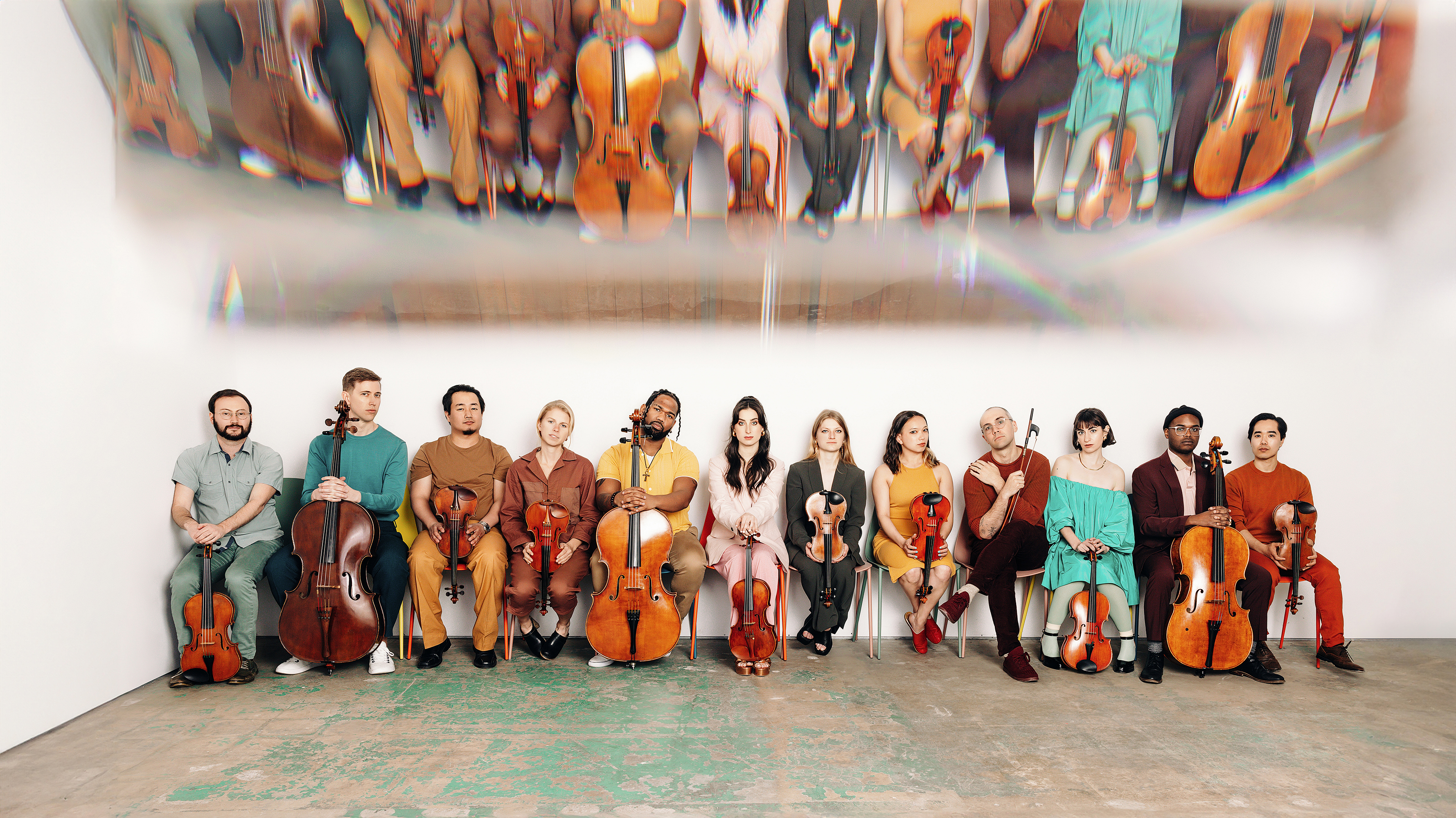
Members of Palaver Strings include founders Brianna Fischler (BUTI’09,’10, CFA’15) and Maya French (‘15) (sixth and seventh from left), along with Nate Taylor (BUTI’10) (fifth from left), Nate Martin (‘11) (fourth from right), and Elizabeth Moore (‘14) (third from right). Photos by Titilayo Ayangade
Connection Through Music
Grammy-nominated ensemble Palaver Strings, founded by two alums, is on a mission to address social injustice, expand music education, and build community
It’s low season in Portland, Maine, in January—a chilly Tuesday night besides—but the line forming outside the heavy wooden door of Scales, a cavernous upscale restaurant on the waterfront, tells a summer story. The crowd is here for a sold-out fundraising event to benefit Palaver Strings, a 13-member, Portland-based chamber music collective and nonprofit organization with a mission to integrate social justice with music. The ensemble, made up of an assortment of stylish 20- and 30-somethings, will play a short set before a three-course dinner to raise money for their tour season and for their Palaver Music Center (PMC), which offers community music and group strings classes and one-on-one lessons to students in grades K through 5 on a sliding scale. On this January night, four third through fifth grade PMC students—some who were involved with Palaver Strings before they were born through the group’s Lullaby Project, which pairs expecting and new parents with professional musicians to write and record original lullabies—will join the professional ensemble for the first time in a public performance. Their parents are here too.
Violinist Maya French (’15) and violist Brianna Fischler (BUTI’09,’10, CFA’15) founded Palaver Strings as first-year students at CFA’s School of Music. Both were unsure they wanted to take the traditional symphony orchestra path; both desired more connection than they felt they were getting spending hours, often alone, in practice rooms.

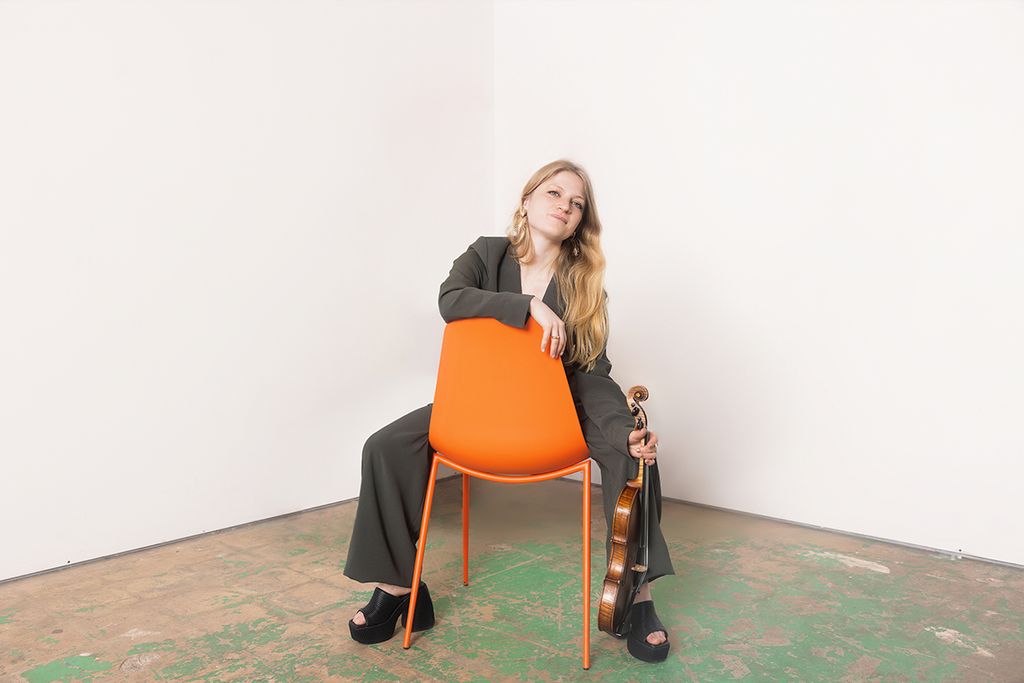
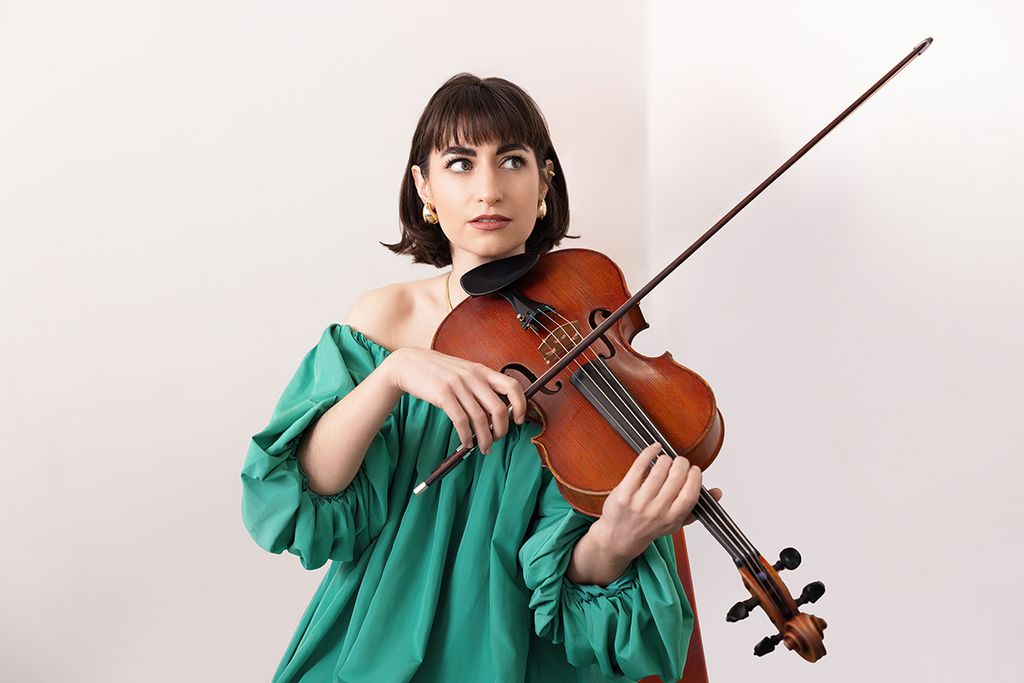
Brianna Fischler (BUTI’09,’10, CFA’15) (from left) and Maya French (‘15) founded Palaver Strings while first-year students at CFA. A few years later, they recruited Elizabeth Moore (‘14) and others.
“We liked the idea of using chamber music and our instruments as tools to connect with other people,” French says. The group grew and changed during its early years, took time off to focus on studies, and officially relaunched in 2014. Among those they recruited was violist Elizabeth Moore (’14), who’d grown up in some of the same mid-coast Maine music circles as French. Five of the current ensemble have connections to CFA; in addition to French, Fischler, and Moore, there’s bassist Nate Martin (’11) and cellist Nate Taylor (BUTI’10).
Today, the ensemble performs in storied venues like Carnegie Hall and the Kennedy Center, has released four albums, and was nominated for a 2025 Grammy Award in the category of Best Classical Solo Vocal Album for their most recent release, A Change Is Gonna Come (Azica Records, 2024).
“So many organizations pick either education or performance, for good reason. It’s a lot. We just really care about both of those things. We also understand that a lot of the systemic racist issues that are happening in classical culture stem from the beginning [of music education]. So if we’re trying to make a difference in the classical culture, we feel strongly that that has to come through education first.”
FINDING CONSENSUS
In its earliest days in Boston, Palaver focused on fundraising concerts for causes and organizations they cared about: mental health, climate change, homelessness, and education.
Early efforts also benefited the Liberian Education Fund, a nonprofit that French had been involved with in high school and from which Palaver derived its name. In West Africa, a palaver hut is a place where people, often from very different backgrounds, meet to find consensus.
From the start, the idea for Palaver Strings was to be led by musicians, with an eye toward diversity in music selection and in programming, and to use music to strengthen and inspire community and connection—especially for the underserved.
But the group quickly learned that fundraising concerts didn’t make much of an impact, says French. “So we shifted to doing concerts that were reflective tools for conversation, and that’s the model that we’ve stayed with,” she says. That meant residencies at Boston Center for the Arts; the Longy School of Music, where they also taught a graduate course in community engagement; and Boston Medical Center, BU’s primary teaching hospital, where their chapter of the Lullaby Project originated. Fischler, French, and Moore received training in music learning theory and began teaching at daycares and coaching chamber music programs for children in underserved communities. These partnerships, says French, helped cement the group’s mission and expand its reach, while also helping the group foment relationships within social service organizations throughout New England.
In 2015, Palaver became a nonprofit and began to search for a new home to launch an instructional program. After an extensive feasibility study and dozens of outreach calls to existing social service organizations to determine location with the greatest amount of need, they moved to Portland in 2018. “I’m not going to say it was easy, but Portland is such a welcoming community,” says Fischler, who is also Palaver’s education coordinator. “Most of the nonprofits we reached out to were so ready to hear about what we wanted to do. And one of the big reasons we chose Portland was because of the new Mainer population here.” US census records showed that, between 2020 and 2022, foreign-born residents accounted for more than 10 percent of all new residents. Not all ensemble members are Palaver Music Center faculty, or based in Portland; the collective allows for flexibility to pursue individual projects, anywhere, and to come together for performances, residencies, rehearsals, and twice-a-year group retreats.
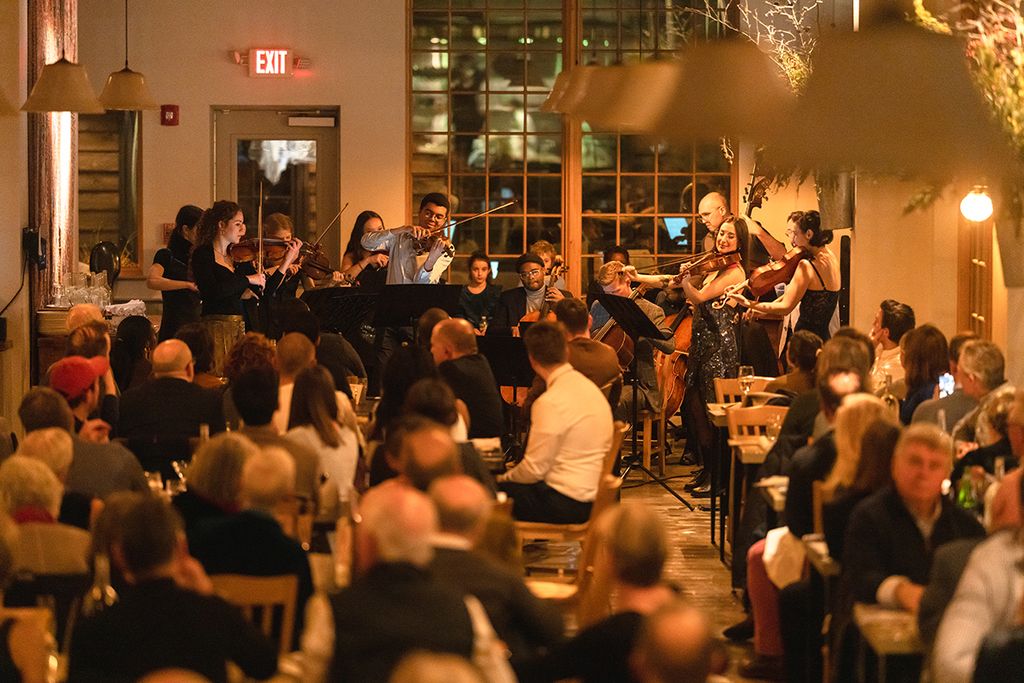
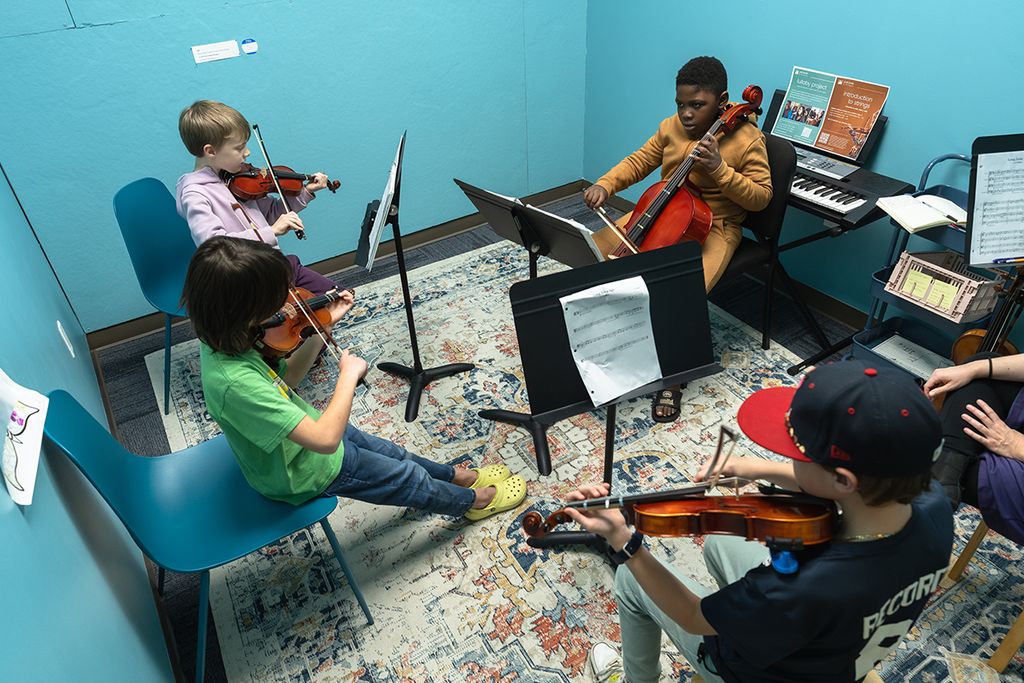
Left: Palaver Strings performs at Scales in Portland in January 2025. Right: The group’s Palaver Music Center, also in Portland, offers music lessons to early learners.
COMMUNITY MUSIC
Chamber music relies on group dynamics and group decisions. There’s no conductor; musicians need to be highly tuned to the group. Palaver’s model, as an organization, works in a similar way. Each of the 13 members of the performance ensemble is a coartistic director. Artistic decisions are made, as in the huts in West Africa, by consensus.
“It’s quite the process, but we’ve decided that even though it’s slow going and often difficult, it’s worth it,” says Moore, who is also programming director. She works with management and venue organizers to secure performance opportunities, which she then pitches to the full group. “It makes us have difficult conversations, which has been really good for our growth.” It’s a skill they aim to teach their students, who are often chosen for performing opportunities based on their ability to both lead and listen.
“Our college experience taught us that it can be possible to make something big from music. It taught us how to make connections, in more ways than one.”
Since 2022, PMC has had a permanent teaching and rehearsal space in Portland’s downtown Arts District. The school day here begins at 2 pm, when kids pile in, shed their backpacks, grab a snack, and disperse for private and group lessons. An instrument room full of tiny instruments is well stocked, thanks in part to grants received over the years from the Classics for Kids Foundation founded by Michael Reynolds, director of CFA’s School of Music and professor of cello.
“What they’re doing is the perfect global approach to developing a career that’s a little out of the box,” says Reynolds. “The community music model—where very fine players work with at-risk kids—can create more long-term job satisfaction. If you’re just educating, you’re going to miss the stage. Meanwhile, performing brings momentary pleasure, but one might start to wonder, am I changing lives?” A new generation of strings players, meanwhile, “gets to see cool, young people playing,” says Reynolds. “They come to understand that not all violin music is fuddy-duddy.”
French, Fischler, Moore, and cellist Matt Smith are the only members of the ensemble currently on the PMC faculty, which is bolstered by part-time faculty from the Portland area. “So many organizations pick either education or performance, for good reason,” says Fischler. “It’s a lot. We just really care about both of those things. We also understand that a lot of the systemic racist issues that are happening in classical culture stem from the beginning [of music education]. So if we’re trying to make a difference in the classical culture, we feel strongly that that has to come through education first.”
Late last year, Palaver Strings received a big surprise in the form of its first Grammy nod, for A Change Is Gonna Come, a collection of rearranged American protest songs made in collaboration with tenor Nicholas Phan and jazz vocalist Farayi Malek. Moore attended the Grammy ceremony in February and came home to tell her students about it. The ensemble didn’t win. But the musicians point to other rewards. “Our college experience taught us that it can be possible to make something big from music,” says French. “It taught us how to make connections, in more ways than one.”
Adds Fischler, “It made us dreamers.”